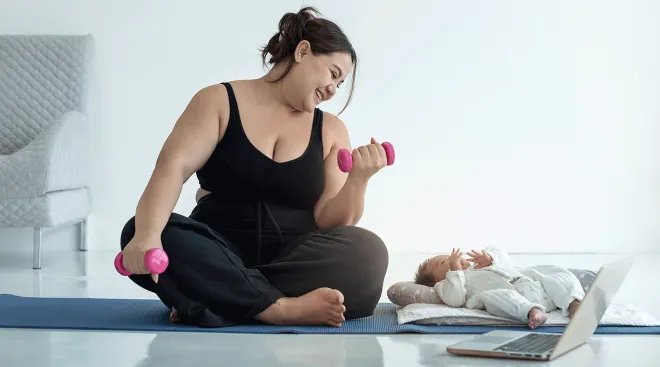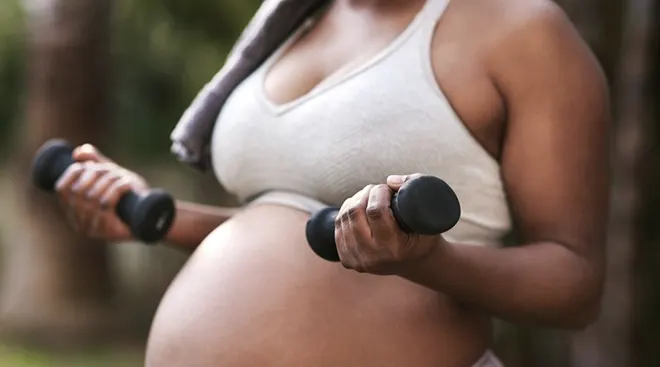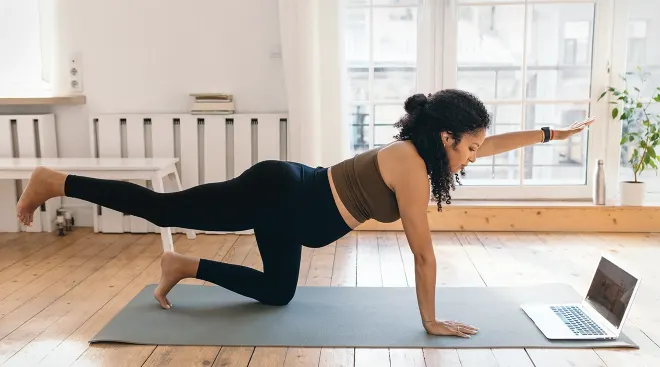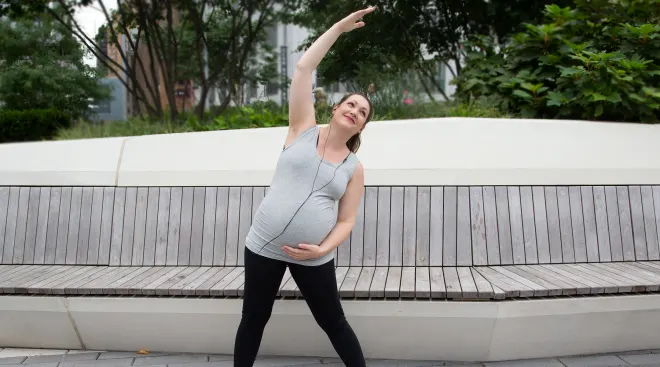Can You Swim While Pregnant?
There’s a lot that’s off limits during those nine+ months of growing a baby, so it’s fair to wonder how many of your pre-pregnancy activities are still safe to enjoy. One activity you may be wondering about is swimming during pregnancy. So, can you swim while pregnant? And is it safe to do so in all bodies of water or are there any risks to be aware of? Here, prenatal experts answer all your questions around swimming while pregnant.
Considering all the things you can’t do while pregnant, it’s fair to wonder: Can you go swimming during pregnancy? Good news: Yes, you can safely swim while pregnant, confirms Meleen Chuang, MD, an ob-gyn and medical director of women’s health at the Family Health Centers at NYU Langone. In fact, it may even provide moms-to-be with a few benefits (more on this below). That said, it’s important to get the green light from your provider. “I wouldn’t do a triathlon or try to swim in dangerous open water, of course, but swimming in a pool, a calm lake or ocean is fantastic,” adds Betina Gozo Shimonek, a certified prenatal fitness specialist and guest coach with Tonal.
Exercising in pregnancy has tons of proven benefits for you and baby—and swimming is one of the best forms of prenatal fitness. “It’s low impact, safely increases heart rate for cardiovascular conditioning and also can help relieve some of the lower back and pelvic discomfort of carrying the weight of the baby, given the ‘anti-gravity’ effects of swimming,” explains Mahino Talib, MD, an ob-gyn with NYU Langone Health.
Below, more benefits of swimming during pregnancy:
- Relieves joint, back and hip pain
- Alleviates swelling and body aches
- Improves circulation and reduces risk of gestational diabetes
- Boosts mood and reduces stress
- Builds on range of motion and offers aquatic resistance training
“It can also help you cool off—especially if you’re in your third trimester in the middle of the summer,” Talib adds.
Most of the risks of swimming while pregnant are the same as those outside of pregnancy. These include:
- Your swimming level: Where you can swim safely will depend on your swimming level. “I wouldn’t advise a pregnant woman who previously has never learned to swim to immerse in a body of water,” Talib says. Plus, as mentioned, swimming in a pool is generally safer than swimming in the open ocean. (If you do decide to swim in the ocean, Talib suggests avoiding rough waters.)
- Slipping and falling: “The main risk is outside of the water, such as slipping and falling on wet surfaces,” Chuang says, adding that “balance can be especially challenging in the third trimester.”
- Extreme temperatures: If you’re outside, it’s important to be mindful of overheating and prolonged sun exposure. Also keep an eye on the temperature of the water, Gozo advises. You want to avoid extremely hot or cold water that could shift your core body temperature; this can have adverse effects on baby. (This is also why hot tubs are a no-no during pregnancy.)
- Infections: While rare, you could potentially be exposed to infections in open water, Chuang says.
- Yeast infections: You may also be at higher risk for a yeast infection, due to “prolonged wearing of wet bathing suits,” she adds.
To mitigate the risks above and ensure safety, the experts note the following tips for swimming while pregnant:
- Protect yourself against the heat: This includes wearing sunscreen and a hat, as well as staying properly hydrated, Talib says.
- Be mindful of slippery surfaces: Take extra precautions when getting in and out of the pool to ensure you don’t slip and fall. Chuang also recommends wearing non-slip shoes.
- Shower and change soon after: Once you’re done swimming, it’s best to change out of your wet swimsuit and rinse off soon after, Chuang says. This protects your skin from drying out and decreases the risk of a yeast infection.
- Be safe and cautious: When it comes to swimming, safety generally looks the same inside and outside of pregnancy. “Make sure you’re comfortable in the water that you’re swimming in—obviously don’t swim in anything you wouldn’t if you weren’t pregnant,” Gozo says. Plus, don’t swim alone—always take a buddy, or swim in an area with an active lifeguard on duty.
- Listen to your body: As with all forms of exercise in pregnancy, listen to your body and don’t overdo it. “Use the scale of perceived exertion versus your heart rate,” Gozo says. “On a scale of 1 to 10, with 1 being easiest and 10 being the hardest, make sure you aren’t exceeding a difficulty of 5 or 6 with the activity or swimming.” Plus, make sure you’re taking breaks, staying hydrated and fueling your body. Talib also cautions against exercising on an empty stomach during pregnancy.
As for swimming postpartum, it’s best to wait until you’ve recovered from childbirth. “Typically, we advise against submerging in a body of water (baths included) until at least six weeks postpartum to avoid the risk of infection,” Talib explains. Chuang agrees, adding you’ll want to get the green light from your provider before starting any kind of exercise postpartum too. If you still have sutures that are healing, they may ask you to wait longer than six weeks.
Frequently Asked Questions
Can a pregnant woman swim in a chlorine pool?
Yes, pregnant women can typically safely swim in chlorine pools. Just ensure there’s good ventilation, try to avoid swallowing the water and rinse off your swim, Chuang adds.
Is a salt water pool safe to swim in during pregnancy?
Salt water pools are also safe to swim in during pregnancy. In fact, they may be “gentler on the skin compared to chlorinated pools,” Chuang says. Still, it’s a good idea to rinse off after your swim to avoid irritation from the salt on your skin or in your eyes.
Is it safe to swim in open water during pregnancy?
“I’d be mindful of open water, just as you would if you weren’t pregnant,” Gozo says. It can be safe “as long as you’re not alone and also are a confident swimmer,” Talib adds. Make sure the water is relatively calm and choose designated safe areas that are supervised by lifeguards, if possible. Chuang also recommends being mindful of currents and watching the tides on shore, as they can cause you to lose your balance and fall. Finally, “avoid open water after rainstorms,” she says, as there can be more pollutants in the water.
Remember to always check in with your doctor to chat about what prenatal fitness activities are best for you and your personal circumstances. That said, as long as you know how to swim and do so with care, there’s nothing wrong with enjoying a pool or beach day and swimming during pregnancy.
Please note: The Bump and the materials and information it contains are not intended to, and do not constitute, medical or other health advice or diagnosis and should not be used as such. You should always consult with a qualified physician or health professional about your specific circumstances.
Plus, more from The Bump:
Meleen Chuang, MD, is an ob-gyn and medical director of women’s health at the Family Health Centers at NYU Langone, as well as the chief of obstetrics and gynecology at NYU Langone Hospital in Brooklyn, NY. She earned her medical degree from SUNY Stony Brook.
Betina Gozo Shimonek is an AFPA certified prenatal fitness specialist, guest coach with fitness platform Tonal and a global trainer with Nike. She’s also the author of Women’s Muscle & Strength: Get Lean, Strong, and Confident.
Mahino Talib, MD, is an ob-gyn with NYU Langone Health and a clinical assistant professor in the ob-gyn department at NYU Grossman School of Medicine. She earned her medical degree from American University of the Caribbean School of Medicine and completed her residency at New York Methodist Hospital.
Learn how we ensure the accuracy of our content through our editorial and medical review process.
Navigate forward to interact with the calendar and select a date. Press the question mark key to get the keyboard shortcuts for changing dates.
Advertisement
Advertisement
Advertisement
Advertisement





















































